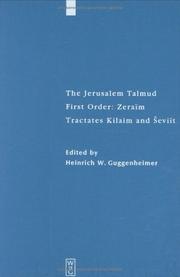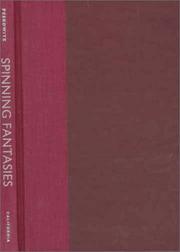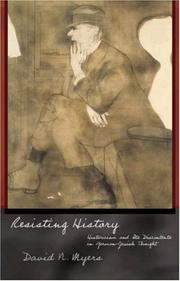| Listing 1 - 10 of 19 | << page >> |
Sort by
|
Book

ISBN: 3110671484 3110671441 Year: 2021 Publisher: Berlin ; Boston : De Gruyter,
Abstract | Keywords | Export | Availability | Bookmark
 Loading...
Loading...Choose an application
- Reference Manager
- EndNote
- RefWorks (Direct export to RefWorks)
Scepticism has been the driving force in the development of Greco-Roman culture in the past, and the impetus for far-reaching scientific achievements and philosophical investigation. Early Jewish culture, in contrast, avoided creating consistent representations of its philosophical doctrines. Sceptical notions can nevertheless be found in some early Jewish literature such as the Book of Ecclesiastes. One encounters there expressions of doubt with respect to Divine justice or even Divine involvement in earthly affairs. During the first centuries of the common era, however, Jewish thought, as reflected in rabbinic works, was engaged in persistent intellectual activity devoted to the laws, norms, regulations, exegesis and other traditional areas of Jewish religious knowledge. An effort to detect sceptical ideas in ancient Judaism, therefore, requires a closer analysis of this literary heritage and its cultural context.This volume of collected essays seeks to tackle the question of scepticism in an Early Jewish context, including Ecclesiastes and other Jewish Second Temple works, rabbinic midrashic and talmudic literature, and reflections of Jewish thought in early Christian and patristic writings. Contributors are: Tali Artman, Geoffrey Herman, Reuven Kiperwasser, Serge Ruzer, Cana Werman, and Carsten Wilke.
Book
ISBN: 9783110441031 3110441039 9783110435283 3110435284 9783110429336 3110429330 Year: 2016 Volume: 90 Publisher: Berlin: de Gruyter,
Abstract | Keywords | Export | Availability | Bookmark
 Loading...
Loading...Choose an application
- Reference Manager
- EndNote
- RefWorks (Direct export to RefWorks)
"This festschrift honours Günter Stemberger on the occasion of his 75th birthday on 7 December 2015 and contains 41 articles from colleagues and students. The studies focus on a variety of subjects pertaining to the history, religion and culture of Judaism - and, to a lesser extent, of Christianity - from late antiquity and the Middle Ages to the modern era"--
Judaism. --- Jews --- Religions --- Semites --- Religion --- Ancient and Medieval Judaism. --- Christianity in its Beginnings. --- Rabbinic Judaism.
Book
ISBN: 3110630729 3110630281 Year: 2019 Publisher: Berlin ; Boston : De Gruyter,
Abstract | Keywords | Export | Availability | Bookmark
 Loading...
Loading...Choose an application
- Reference Manager
- EndNote
- RefWorks (Direct export to RefWorks)
The contributors and editors dedicate this volume of research to Professor Stefan C. Reif on the occasion of his 75th birthday. Together these twenty papers reflect our appreciation for his exemplary scholarship and lifelong commitment to acquaint our world with the theological and cultural riches of Jewish Studies.This collection reflects the breadth of Prof. Reif's interests insofar as it is a combination of Second Temple studies and Jewish studies on the roots of Jewish prayer and liturgy which is his main field of expertise. Contributions on biblical and second temple studies cover Amos, Ben Sira, Esther, 2 Maccabees, Judith, Wisdom, Qumran Psalms, and James. Contributions on Jewish studies cover nuptial and benedictions after meals, Adon Olam, Passover Seder, Amidah, the Medieval Palestinian Tefillat ha-Shir, and other aspects of rabbinic liturgy.Moreover, the regional diversity of scholars from Israel, continental Europe, the United Kingdom, Ireland and North America mirrors Stefan's travels as a lecturer and the reach of his publications. The volume includes a foreword of appreciation and a bibliographic list of Professor Reif's works.
Prayer --- Judaism. --- Bible. --- Criticism, interpretation, etc. --- Prayer. --- Second Temple studies. --- liturgy. --- rabbinic Judaism.
Book
ISBN: 1280042516 9786613517159 3161514726 3161506472 Year: 2011 Publisher: Tübingen : Mohr Siebeck,
Abstract | Keywords | Export | Availability | Bookmark
 Loading...
Loading...Choose an application
- Reference Manager
- EndNote
- RefWorks (Direct export to RefWorks)
Hauptbeschreibung Holger M. Zellentin seeks to probe how far the classical rabbis took their literary playfulness in order to advance their religious and societal causes. Building on the literary approaches to rabbinic Judaism of the past decades, this work considers the rabbis' attitudes towards their Byzantine and Sassanian surroundings. The author examines how the Talmud and Midrash in Palestine and Persia repeat previous texts with comical difference, oscillating between reverence and satire. The result shows rabbinic society and its literature engaging in the great debates of t
Christian literature, Early --- Rabbinical literature --- History and criticism. --- Talmud --- Sermon on the mount --- Midrash --- Rabbinic Judaism --- Rabbinic Parodies --- Antike --- Religionswissenschaft --- Neues Testament
Book
ISBN: 1487548257 1487548249 Year: 2023 Publisher: Bielefeld : University of Toronto Press,
Abstract | Keywords | Export | Availability | Bookmark
 Loading...
Loading...Choose an application
- Reference Manager
- EndNote
- RefWorks (Direct export to RefWorks)
"In Jews, Judaism, and Success, Robert Eisen attempts to solve a long-standing mystery that has fascinated many: How did Jews become such a remarkably successful minority in the modern western world? Eisen argues that Jews achieved such success because they were unusually well-prepared for it by their religion--in particular, Rabbinic Judaism, or the Judaism of the rabbis. Rooted in the Talmud, this form of Judaism instilled in Jews key values that paved the way for success in modern western society: autonomy, freedom of thought, worldliness, and education. The book carefully analyses the evolution of these four values over the past two thousand years in order to demonstrate that they had a longer and richer history in Jewish culture than in western culture. The book thus disputes the common assumption that Rabbinic Judaism was always an obstacle to Jews becoming modern. It demonstrates that while modern Jews rejected aspects of Rabbinic Judaism, they also retained some of its values, and these values in particular led to Jewish success. Written for a broad range of readers, Jews, Judaism, and Success provides unique insights on the meaning of success and how it is achieved in the modern world."--
Jews --- Judaism. --- Success --- Values --- Jewish ethics. --- Civilization. --- Religious aspects --- Talmud. --- Einstein. --- Freud. --- Golda Meir. --- Jewish achievement. --- Jewish culture. --- Jewish success. --- Jews. --- Marx. --- Rabbinic Judaism. --- education. --- jewish culture in the western world. --- modern Jews. --- success. --- values of Judaism.
Book
ISBN: 9780521728515 9780521899864 0521899869 0521728517 9780511976391 Year: 2011 Volume: *23 Publisher: Cambridge Cambridge University Press
Abstract | Keywords | Export | Availability | Bookmark
 Loading...
Loading...Choose an application
- Reference Manager
- EndNote
- RefWorks (Direct export to RefWorks)
"The miracle stories of the founders and saints of the major world religions have much in common. Written by international experts, this Companion provides an authoritative and comparative study of miracles in not only Hinduism, Islam, Buddhism, Christianity and Judaism, but also, indigenous religions. The authors promote a discussion of the problems of miracles in our largely secular culture, and of the value of miracles in religious belief. The miracles of Jesus are also contextualized through chapters on the Hebrew Bible, classical culture to the Romans, Second Temple and early rabbinic Judaism and early Christianity. This book provides students with a scholarly introduction to miracles, which also covers philosophical, medical and historical issues"--
Miracles --- History --- Histoire --- 231.731 --- Miracles. --- God --- Marvelous, The --- Miracle workers --- Spiritual healing --- Supernatural --- Wonderen. Bovennatuurlijke feiten --- Religion --- General --- 231.731 Wonderen. Bovennatuurlijke feiten --- General. --- Christian spirituality --- Comparative religion --- founders of the world's major religions --- saints --- Hinduism --- Buddhism --- Christianity --- Judaism --- miracles --- secularism --- culture --- religious belief --- Jesus --- the Hebrew Bible --- Second Temple --- early rabbinic Judaism --- early Christianity --- philosophy --- medicine --- history

ISSN: 09342575 ISBN: 3110171228 3110849194 3110166917 3110165910 3110174367 3110177633 3110182912 3110186683 9783110190335 9783110194593 9783110202908 9783110209433 9783110219609 9783110258059 9783110289008 9783110354362 311081658X 3111850242 3110800489 3110919265 3110906759 3110891824 3110190338 3110910209 3110908468 9783110166910 3110258056 9783110186680 9783110177633 9783110174366 3110289008 3110354365 3110202905 9783110182910 3110194597 3110209438 9783110171228 9783110165913 3110219603 3110289032 3110898896 3110971267 3110357488 3110386631 3110681323 Year: 2014 Volume: 18-21, 23, 29, 31, 34, 39, 43, Publisher: Berlin, [Germany] ; Boston, [Massachusetts] : Walter de Gruyter GmbH,
Abstract | Keywords | Export | Availability | Bookmark
 Loading...
Loading...Choose an application
- Reference Manager
- EndNote
- RefWorks (Direct export to RefWorks)
This volume of the Jerusalem Talmud publishes four tractates of the Second Order, Šeqalim, Sukkah, Roš Haššanah, and Yom Tov. These tractates deal with financial issues concerning the Temple service, with the festival of Tabernacles, the observations at New Year, as well as with holiday observation in general. The tractates are vocalized by the rules of Rabbinic Hebrew accompanied by an English translation and an extensive commentary.
296*221 --- Talmud van Jeruzalem --- 296*221 Talmud van Jeruzalem --- Talmud de Jérusalem. (hébreu-anglais). 2000-2014 --- Talmud Yerushalmi --- Jerusalem Talmud --- Palestinian Talmud --- Talmud, Jerusalem --- Talmud, Palestinian --- Jerusalemische Talmud --- Talmud de Jérusalem --- Yerushalmi (Talmud) --- Talmud ha-Maʻarav --- Judaism --- History --- Mishnah. --- Talmud Yerushalmi. --- Rabbinical literature. --- Talmud --- Criticism, interpretation, etc. --- Berakhot (Mishnah) --- Berakot (Mishnah) --- Beracoth (Mishnah) --- Religions. --- Rabbinische Schriften. --- Talmud. --- RELIGION / Judaism / General. --- Theology and Religious Studies --- Jewish Studies --- Rabbinic Judaism. --- Rabbinic Judaism --- Rabbinic scipture. --- Rabbinische Schrift. --- RELIGION / Judaism / Talmud. --- Maʻaserot (Talmud Yerushalmi) --- Terumot (Talmud Yerushalmi) --- Comparative religion --- Denominations, Religious --- Religion, Comparative --- Religions, Comparative --- Religious denominations --- World religions --- Civilization --- Gods --- Religion --- Sheviʻit (Talmud Yerushalmi) --- Kilayim (Talmud Yerushalmi) --- Kelayim (Talmud Yerushalmi) --- Hebrew literature --- Jewish literature --- Nedarim (Talmud Yerushalmi) --- Sotah (Talmud Yerushalmi) --- Rabbinic scripture. --- Talmûd yerûšalmî --- Commentary --- Rabbinic Scripture --- Rabbinical literature --- Marriage. --- Talmud Yerushalmi. -- Beẓah -- Commentaries. --- Talmud Yerushalmi. -- Rosh ha-Shanah -- Commentaries. --- Talmud Yerushalmi. -- Shekalim -- Commentaries. --- Talmud Yerushalmi. -- Sukkah -- Commentaries. --- Edition. --- Rabbinic Scripture.

ISBN: 0520919491 0585130914 9780520919495 9780585130910 9780520209671 0520209672 0520208315 0520209672 Year: 1997 Publisher: Berkeley, California : University of California Press,
Abstract | Keywords | Export | Availability | Bookmark
 Loading...
Loading...Choose an application
- Reference Manager
- EndNote
- RefWorks (Direct export to RefWorks)
Miriam Peskowitz offers a dramatic revision to our understanding of early rabbinic Judaism. Using a wide range of sources--archaeology, legal texts, grave goods, technology, art, and writings in Hebrew, Aramaic, Greek, and Latin--she challenges traditional assumptions regarding Judaism's historical development. Following the destruction of the Jerusalem Temple by Roman armies in 70 C.E., new incarnations of Judaism emerged. Of these, rabbinic Judaism was the most successful, becoming the classical form of the religion. Through ancient stories involving Jewish spinners and weavers, Peskowitz re-examines this critical moment in Jewish history and presents a feminist interpretation in which gender takes center stage. She shows how notions of female and male were developed by the rabbis of Roman Palestine and why the distinctions were so important in the formation of their religious and legal tradition. Rabbinic attention to women, men, sexuality, and gender took place within the "ordinary tedium of everyday life, in acts that were both familiar and mundane." While spinners and weavers performed what seemed like ordinary tasks, their craft was in fact symbolic of larger gender and sexual issues, which Peskowitz deftly explicates. Her study of ancient spinning and her abundant source material will set new standards in the fields of gender studies, Jewish studies, and cultural studies.
Sex in rabbinical literature --- Women in rabbinical literature --- Textile crafts in rabbinical literature --- Rabbinical literature --- Sex role --- Judaism --- Religion --- Philosophy & Religion --- Gender role --- Sex (Psychology) --- Sex differences (Psychology) --- Social role --- Gender expression --- Sexism --- Hebrew literature --- Jewish literature --- Women in the Talmud --- History and criticism --- Religious aspects --- Gender roles --- Gendered role --- Gendered roles --- Role, Gender --- Role, Gendered --- Role, Sex --- Roles, Gender --- Roles, Gendered --- Roles, Sex --- Sex roles --- Sex in rabbinical literature. --- Textile crafts in rabbinical literature. --- Women in rabbinical literature. --- History and criticism. --- Judaism. --- challenges traditional assumptions. --- classic form of religion. --- critical moment in jewish history. --- destruction of jerusalem temple. --- feminist interpretation. --- judaisms historical development. --- new incarnations of judaism. --- rabbinic judaism. --- rabbis of roman palestine. --- study of ancient spinning. --- understanding of early rabbinic judaism.
Book
ISBN: 9780520958999 0520958993 9780520277250 0520277252 0520383184 Year: 2014 Publisher: Berkeley
Abstract | Keywords | Export | Availability | Bookmark
 Loading...
Loading...Choose an application
- Reference Manager
- EndNote
- RefWorks (Direct export to RefWorks)
Migrating Tales situates the Babylonian Talmud, or Bavli, in its cultural context by reading several rich rabbinic stories against the background of Greek, Syriac, Arabic, Persian, and Mesopotamian literature of late antiquity and the early Middle Ages, much of it Christian in origin. In this nuanced work, Richard Kalmin argues that non-Jewish literature deriving from the eastern Roman provinces is a crucially important key to interpreting Babylonian rabbinic literature, to a degree unimagined by earlier scholars. Kalmin demonstrates the extent to which rabbinic Babylonia was part of the Mediterranean world of late antiquity and part of the emerging but never fully realized cultural unity forming during this period in Palestine, Syria, Mesopotamia, and western Persia. Kalmin recognizes that the Bavli contains remarkable diversity, incorporating motifs derived from the cultures of contemporaneous religious and social groups. Looking closely at the intimate relationship between narratives of the Bavli and of the Christian Roman Empire, Migrating Tales brings the history of Judaism and Jewish culture into the ambit of the ancient world as a whole.
Narration in rabbinical literature. --- RELIGION --- HISTORY --- Judaism --- General. --- Ancient --- Talmud --- Talmud. --- Criticism, Narrative. --- Talmud -- Criticism, Narrative. --- Narration in rabbinical literature --- Religion --- Philosophy & Religion --- History --- Talmud Bavli --- Babylonian Talmud --- Talmud, Babylonian --- Talmud Vavilonskiĭ --- Talmoed, Babylonische --- Babylonische Talmoed --- Shas --- Shishah sedarim --- Talmud of Babylonia --- Talmud de Babilonia --- Talmud Babli --- Talmouth --- Talmod --- Narration (Rhetoric) --- Rabbinical literature --- ancient greek literature. --- ancient history. --- ancient literature. --- ancient mesopotamian literature. --- ancient persian literature. --- ancient syriac literature. --- antiquity. --- babylonian rabbinic literature. --- babylonian talmud. --- bavli. --- christian roman empire. --- christianity. --- cultural context. --- gemara. --- jewish cultural life. --- jewish history. --- jewish religious law. --- jewish theology. --- judaism. --- literary. --- middle ages. --- mishnah. --- rabbinic judaism. --- rabbinic stories. --- religion. --- talmud.

ISBN: 0691115931 Year: 2003 Publisher: Princeton (N.J.): Princeton university press
Abstract | Keywords | Export | Availability | Bookmark
 Loading...
Loading...Choose an application
- Reference Manager
- EndNote
- RefWorks (Direct export to RefWorks)
Nineteenth-century European thought, especially in Germany, was increasingly dominated by a new historicist impulse to situate every event, person, or text in its particular context. At odds with the transcendent claims of philosophy and--more significantly--theology, historicism came to be attacked by its critics for reducing human experience to a series of disconnected moments, each of which was the product of decidedly mundane, rather than sacred, origins. By the late nineteenth century and into the Weimar period, historicism was seen by many as a grinding force that corroded social values and was emblematic of modern society's gravest ills. Resisting History examines the backlash against historicism, focusing on four major Jewish thinkers. David Myers situates these thinkers in proximity to leading Protestant thinkers of the time, but argues that German Jews and Christians shared a complex cultural and discursive world best understood in terms of exchange and adaptation rather than influence.After examining the growing dominance of the new historicist thinking in the nineteenth century, the book analyzes the critical responses of Hermann Cohen, Franz Rosenzweig, Leo Strauss, and Isaac Breuer. For this fascinating and diverse quartet of thinkers, historicism posed a stark challenge to the ongoing vitality of Judaism in the modern world. And yet, as they set out to dilute or eliminate its destructive tendencies, these thinkers often made recourse to the very tools and methods of historicism. In doing so, they demonstrated the utter inescapability of historicism in modern culture, whether approached from a Christian or Jewish perspective.
Historicism --- Jewish learning and scholarship --- Judaism --- History --- Historiography --- Breuer, Isaac, --- Cohen, Hermann, --- Rosenzweig, Franz, --- Strauss, Leo. --- History. --- Historiography. --- Agudat Yisrael. --- Balfour Declaration. --- Benjamin, Walter. --- Breuer, Salomon. --- Cassirer, Ernst. --- Conservative Revolution. --- Davos conference. --- Denominationalism. --- Dilthey, Wilhelm. --- Ehrenfreund, Jacques. --- Enlightenment. --- Erets Yisrael. --- Fischer, Kuno. --- Frankfurt am Main. --- Funkenstein, Amos. --- Geiger, Abraham. --- Geisteswissenschaft. --- Guttmann, Julius. --- Hegelianism. --- Heidegger, Martin. --- Jewish nation. --- Jewishness. --- Kassel. --- Kellerman, Benzion. --- Kierkegaard, Søren. --- Kulturprotestantismus. --- Lazarus, Moritz. --- Luther, Martin. --- Marr, Wilhelm. --- Meinecke, Friedrich. --- Naturwissenschaft. --- Neue Kusari. --- Nordau, Max. --- Otto, Rudolf. --- Rabbinic Judaism. --- Revelation. --- Rosenheim, Jacob. --- Scholem, Gershom. --- Uganda proposal. --- anti-historicism. --- assimilation. --- biblical prophets. --- communitarianism. --- conversion to Christianity. --- cultural bifocality. --- ecclesiastical history. --- historical Jesus movement. --- historicism. --- philosophy. --- positivism. --- post-structuralism. --- systematic theology.
| Listing 1 - 10 of 19 | << page >> |
Sort by
|

 Search
Search Feedback
Feedback About UniCat
About UniCat  Help
Help News
News